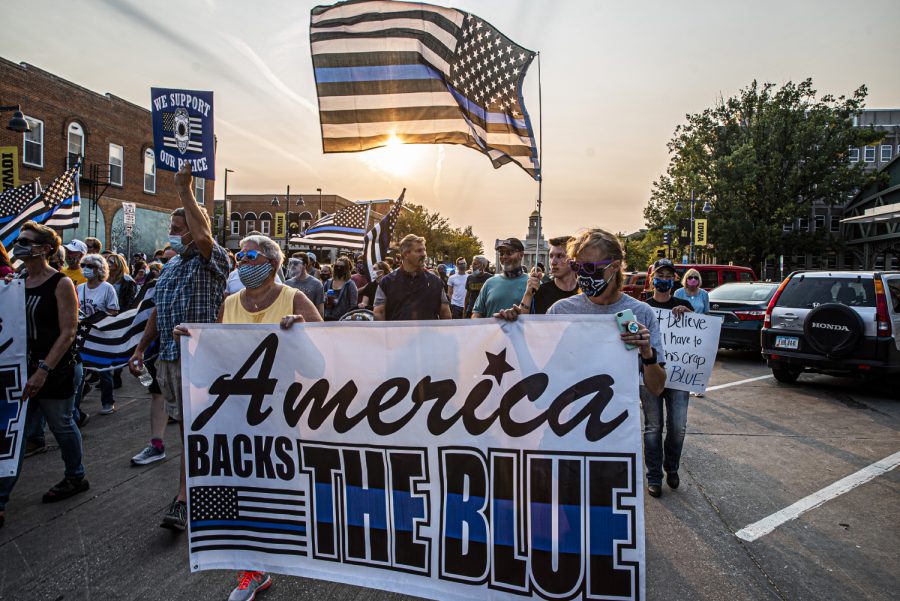Guest Opinion | ‘Back the Blue’ bill will harm rather than help Iowa
The ‘Back the Blue’ bill deprives Iowans of basic rights and subjects Iowans to serious harm.
Citizens march through downtown Iowa City as part of the the Back the Blue protest on Friday, September 25th, 2020. Citizens marched through downtown Iowa City to show solidarity with the local police force and as a counter protest the Black Lives Matter activity that took place over the past few months.
April 14, 2021
In response to racial justice protests last summer, Republicans in the Iowa Legislature have introduced bills that ramp up penalties on protest activity and limit local government discretion in dealing with protests and public safety issues.
Iowa House Republicans have bundled into House File 1345, multiple bills previously passed by the Iowa Senate (SF 476). The new “Back the Blue” bill is broad, affecting everything from sick leave for public safety officers to punishments for riots and eluding police. Although some parts of this wide-ranging bill are fine, others are dangerous and disturbing. It will likely chill the First Amendment rights of freedom of speech and assembly, punish harmless activity, and escalate and immunize violence. In short, this bill will make us less free and less safe.
While the bill is targeted at protests in Iowa City and Des Moines following the murder of George Floyd last summer, it is not unique. Across the country, some 91 similar bills have been introduced into state legislatures, according to the International Center for Not-For-Profit Law. This is part of a concerted, nationwide effort to crack down on protests and to strip law enforcement and local government of any discretion to respond to them.
The House bill subjects protesters, and perhaps others perceived as protesters, to severe harm and penalties:
- If protesters block traffic and do not have a permit, a driver who plows into them and hurts or kills someone would be immune from civil liability in most circumstances, even if the driver was negligent or grossly negligent.Whether or not we agree with everything protesters do, they do not deserve to be injured or die.
- The penalty for engaging in a “riot” is increased from an aggravated misdemeanor to a class “D” felony, which could result in up to five years in prison and loss of voting rights. The penalty for engaging in an “unlawful assembly” is increased from a simple misdemeanor to an aggravated misdemeanor, which could result in two years in prison. These severe penalties might be appropriate for activities resulting in serious harm, but the definitions of “riot” and “unlawful assembly” are broad and vague enough to include situations where little or no harm occurs.
- It would be a serious misdemeanor to obstruct any street, sidewalk, highway, or other public way with the intent to prevent or hinder its lawful use by others.
- It would be a serious misdemeanor not to stop for an “unmarked” law enforcement vehicle driven by a plain-clothes law enforcement officer. Those in the communities of color, women, and others driving at night would have to pull over for anyone with red or red/blue flashing lights, no matter how unsafe it may be. The penalty for failing to do so could be up to a year in jail.
In addition to imposing severe punishments for a wide range of conduct, the House bill strips away local discretion by preventing law enforcement or local government from deciding, based on circumstances, not to enforce a provision of state, local, or municipal law. A local government found in violation would be denied state funds for the following fiscal year. In other words, the bill effectively defunds both law enforcement and municipal operations for exercising discretion they have always had.
It is impossible to enforce every single law all the time. Given limited budget and personnel resources, local discretion to determine enforcement priorities is critical to keeping the public and law enforcement officers safe. Tying the hands of law enforcement — giving them no choice but to enforce — is a recipe for increased tensions and conflict.
Many parts of the “Back the Blue” bill are extreme and unnecessary. Existing state laws are more than adequate to deal with protests. By ramping up penalties for vaguely defined crimes, this bill is likely to chill First Amendment rights of free speech and assembly. It also subjects young people and others to serious harm, and it prevents law enforcement from exercising critical discretion on how best to respond to fluid, quickly moving, and potentially dangerous situations. A bill supposedly about law and order will ultimately deprive us of our rights under law and make our communities less safe.
–Christina Bohannan, State Rep. House District 85 and University of Iowa Law professor
–Janice Weiner, Iowa City City Councilor



